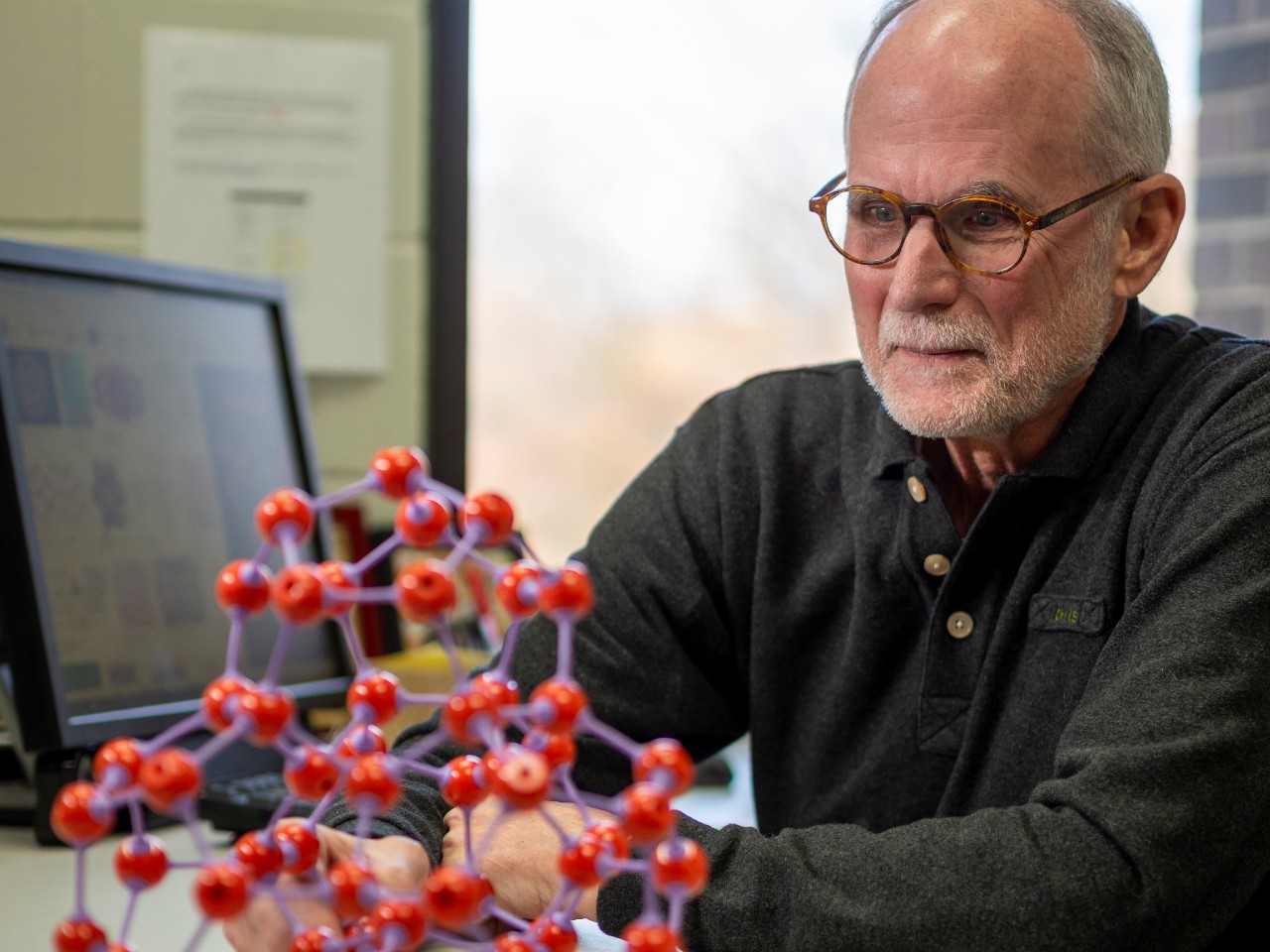
UC Clermont professor creates patent for breakthrough chemotherapy tech
Research could lead to more effective drug delivery for cancer patients
UC Clermont College chemistry Professor Cliff Larrabee has a lofty goal: to cure cancer. And with his latest research now pending patent, he is one step closer to that goal.
“I don’t know anyone who doesn’t know someone affected by cancer,” Larrabee said. “And for the students working with me in the lab, the research has contributed directly to a potential cancer treatment.”
Larrabee has worked with UC Clermont students on cancer research since 2009. Last summer, he submitted a patent with co-inventor and former student Mary Warmin, who is now the senior chemistry lab associate for the Science & Health Department. The patent is for a new nanocarrier targeted drug delivery system based on undecylenic acid — i.e., a more effective method of delivering chemotherapy drugs to cancer patients. Nanocarriers are even smaller than cells and help drugs dissolve in the blood and protect them from the body’s defense mechanisms.
The patent, which Larrabee and Warmin submitted through the University of Cincinnati’s Office of Innovation, was recently filed internationally.
“I would like to see cancer cured or at least tamed,” Larrabee said. “This patent application is the result of many years of hard work in UC Clermont’s labs and by our students.”
UC Clermont students have worked with Larrabee in his research lab on campus since 2009, with their stints sponsored by UC’s Women in Science and Engineering initiative and by the UC Office of Research. Over time, the college Dean’s Office began providing additional support, and today, students conduct research with Larrabee’s guidance through independent study and in teams. Twenty-one UC Clermont students have been involved in his research since the beginning of the program. He has also helped students pursue publication and present their research at a number of national and international conferences.
Larrabee believes the potential uses of the new technology could also deliver antibiotics to cancer tumors and possibly slow, or prevent metastasis.
“You can kill cancer stem cells with antibiotics,” Larrabee said. “And if you can kill them before they differentiate, maybe you can prevent metastasis.”
For anyone who has an idea with potential commercial impact, or who is interested learning more about UC’s Office of Innovation, visit innovation.uc.edu. To learn more about UC Clermont, visit ucclermont.edu.
Related Stories
Discovery Amplified expands research, teaching support across A&S
February 19, 2026
The College of Arts & Sciences is investing in a bold new vision for research, teaching and creative activity through Discovery Amplified. This initiative was launched through the Dean’s Office in August 2024, and is expanding its role as a central hub for scholarly activity and research support within the Arts & Sciences (A&S) community. Designed to serve faculty, students, and staff, the initiative aims to strengthen research productivity, foster collaboration, and enhance teaching innovation. Discovery Amplified was created to help scholars define and pursue academic goals while increasing the reach and impact of A&S research and training programs locally and globally. The unit provides tailored guidance, connects collaborators, and supports strategic partnerships that promote innovation across disciplines.
Blood Cancer Healing Center realizes vision of comprehensive care
February 19, 2026
With the opening of research laboratories and the UC Osher Wellness Suite and Learning Kitchen, the University of Cincinnati Cancer Center’s Blood Cancer Healing Center has brought its full mission to life as a comprehensive blood cancer hub.
UC Digital Futures and Cincinnati Fire Museum launch educational video game
February 17, 2026
A new collaboration between the University of Cincinnati's Digital Performance Lab (DP Lab), CCM Acting, UC's School of Information Technology, and the Cincinnati Fire Museum is using gaming technology to bring essential fire safety education to children. The project titled Fire Escape is an interactive video game designed to teach K-12 students how to respond safely during a house fire. It was developed through Digital Futures research support, student game development, and guidance from local fire safety professionals.
